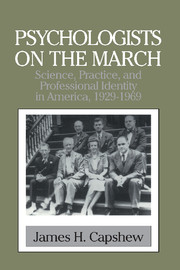Psychologists on the March
Psychologists on the March argues that the Second World War had a profound impact on the modern psychological profession in America. Before the war, psychology was viewed largely as an academic discipline, drawing its ideology and personnel from the laboratory. Following the war, it was increasingly seen as a source of theory and practice to deal with mental health issues. With the support of the federal government, the field entered a prolonged period of exponential growth. With this growth came major changes in the institutional structure of the field that spread to include the epistemological foundations of psychology. This book is a sustained study of this important era in American psychology. Moving back and forth between collective and individual levels of analysis, it provides a narrative that weaves together the internal politics and demography of psychology in relation to the cultural environment.
- In-depth history of the impact of Word War II on the American psychological profession
- Wide ranging and highly topical study
Product details
April 2011Adobe eBook Reader
9780511891113
0 pages
0kg
This ISBN is for an eBook version which is distributed on our behalf by a third party.
Table of Contents
- Introduction: the psychologists' war
- 1. Growing pains: after the Great War
- 2. Mobilizing for World War II: from national defense to professional unity
- 3. Home fires: women psychologists and the politics of gender
- 4. Sorting soldiers' psychology as personnel management
- 5. Applied human relations: The utility of social psychology
- 6. From the margins: making the clinical connection
- 7. Engineering behavior: applied experimental psychology
- 8. A new order: postwar support for psychology
- 9. Remodeling the academic home
- 10. The mirror of practice: towards a reflective science
- 11. Beyond the laboratory: giving psychology away
- Epilogue: science in search of self.








